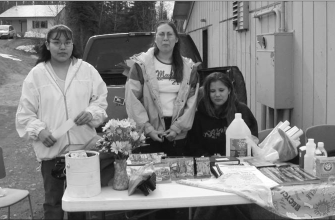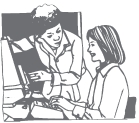SUPPORTING COMMUNITY INVOLVEMENT
PART 2
| The whole community should be involved in creating guidelines
for tourism development. |
Tourism can impact the whole community;
therefore the whole community should have the opportunity to
provide their input
on tourism
issues.
There are many different ways to get
input and involvement in community issues. This section will
give you specific strategies
and ideas for initiating and supporting community guided tourism
development.
A. STRATEGIES
FOR INVOLVING THE WHOLE COMMUNITY
B. WORKSHOPS
SAMPLE WORKSHOP AGENDAS
C. CONDUCTING SURVEYS
D. FOLLOW-UP
E. IDENTIFY YOUR CORE GROUP
A. Strategies
for involving the whole community
PART 2
| EDUCATE YOURSELF |
The person that is making an effort to develop tourism
with and within the community should know a little bit
about the subject before recruiting “team members”.
Here are a few starters:
- Visitor statistics: How many
local and statewide tourists are there?
- What are
the region's attractions?
- Local resources:
Is there a visitor's center,
state park, National Park, or Chamber of Commerce
nearby? Make a list of local and statewide resources.
- Attend tourism conferences or other related public
meetings. Invite Tribal council members to attend
conferences with you.
|
| MAKE A LIST |
Make a list of community members and their contact information.
You can also print mailing labels for each member, which
will make it easy for you to send frequent mail-outs to the
community. |

EVERYONE IS DIFFERENT AND WILL BE INVOLVED IN THE TOURISM
DEVELOPMENT PROCESS IN DIFFERENT WAYS.
|
| ELDERS |
Elders contain the bulk of traditional
knowledge and should be consulted early in the process
about any plans
to promote
tourism in the community. It is especially important to
ask for input concerning what parts of the culture to share
and
not share and what lands are open to visitors as well as
which lands to keep “closed”.
Prepare a list
of specific questions that you want answered and go visiting.
You can often get more information from an Elder in his or her own home (over
a cup of tea) then you would at a community workshop. Be sure to invite the
Elder
to the tourism workshop in case they would like to attend. |
| TRIBAL LEADERS |
Tribal leaders are the link between traditional Indigenous
knowledge and the American culture. Generally, it will be
the tribal leaders who guide the tourism development process.
Communicate with your tribal leaders. Invite them to every
workshop and any other tourism and/or community development
meeting. Send them regular emails or written reports to make
it easy for them to stay informed. |
| BUSINESS OWNERS |
All of the business owners in the community play a role
in community development. The business owner should be invited
to every tourism workshop even if the business is not specifically
related to tourism. Their involvement helps create good relations
between business owners. They may also have important business
knowledge to pass on to the future business owners. |
| YOUTH |
Send workshop invitations to the youth in the community.
Youth participation adds energy and fresh ideas to community
workshops. |
Sometimes all you have to do is ask. Young
people can be a great help in organizing community events.
Chistochina youth became involved in an Earth Day event. |

Courtesy
of Chantelle Pence |
| We involved
youth by inviting a young tribal member to help coordinate
the first ecotourism workshop. Their participation was very
helpful to the program coordinator and the exposure was good
for the youth member. |
| EVERYONE ELSE |
Always send workshop invitations to everyone in the community.
Use a variety of methods to get the word out. Post workshop
notices in conspicuous places and advertise in the local
paper. |
B. Workshops
PART 2
| Workshops are a good platform in which to organize ideas,
discuss solutions and educate community members. |
TIPS
FOR COORDINATING AN EFFECTIVE WORKSHOP:
| GET THE WORD OUT |
Use a variety of methods for notifying the public. Keep
in mind that everyone will respond to different types of
invitations. Make flyers to post in conspicuous places, make
personal phone calls, mail out personal letters and send
emails. |
| OFFER INCENTIVES |
Check with your local college or university to see if college
credit can be received for attending the workshop. Be sure
to let the public know if they can get college credit if
they attend. Door prizes are always fun. Have a drawing for
books on ecotourism (see the resource section for a list
of books) or other tourism-related services. |
| BE PREPARED |
Make a checklist of items needed for the workshop.
Your list may include poster paper and easel, markers, pens
and
notepads for participants and copies of handouts.
Make a resource
binder for each of the participants that includes local
and statewide resources and specific tourism or business
development
information. |
|
| HONOR THE PARTICIPANTS |
Treat the workshop participants well! Their
participation and input is vital to sustainable community
development.
Idea:
Prepare flower kits for each participant. You will need a pack of flower seeds,
a zip-lock bag full of potting soil and a seed starter tray. Put a note in
with the flower kit that says “A community is like a flower, it takes
time and care to develop into something beautiful.” |
|
| SERVE GOOD FOOD |
Good food makes the gathering! It honors the
participants and gives everyone a chance to talk in a relaxed
environment.
Idea:
Serve traditional foods or make an organic meal. |
|
| FOLLOW-UP |
This step is often overlooked. ALWAYS connect
with the participants and community after the workshop. Mail
a summary of what was discussed, ideas that people had, answers
to questions and what participants can look forward to in
future workshops. |

B. Workshops
PART 2
What Should You Talk About At The
1st Tourism Workshop?
 1.HOW DOES EVERYONE FEEL ABOUT COMMUNITY DEVELOPMENT/TOURISM
DEVELOPMENT?
1.HOW DOES EVERYONE FEEL ABOUT COMMUNITY DEVELOPMENT/TOURISM
DEVELOPMENT?
This is extremely important! Sometimes
people will be opposed to tourism or community development simply
because they haven't
had a chance to provide their input. Give everyone an opportunity
to express his or her views. Listen and reiterate what has
been discussed so the speaker knows they're heard.
Clarify their point if needed.
2. DEFINE WHAT IS UNIQUE ABOUT
YOUR COMMUNITY.
What makes your community special?
Why do people like to live there? Why would tourists be interested
in
coming to
your community?
3. IDENTIFY EXISTING BUSINESSES OR
TOURISM RELATED BUSINESSES.
What services already exist in the
community? Begin a list of services.
4. LET PEOPLE DREAM.
Are there people
in the community who have plans to start their own tourism-related
business? Brainstorm and
write down ideas.
5. DISCUSS THE PROS AND CONS OF TOURISM
DEVELOPMENT. HOW WILL TOURISM DEVELOPMENT IMPACT THE COMMUNITY?
Again,
let people express themselves. Record each speaker's
ideas.
| Local businesses should not view each other as competition. |
6. ENCOURAGE NETWORKING BETWEEN BUSINESSES.
This
is one of the most important steps to take. Good relations
between local businesses
are vital
to sustainable
community
development. Discuss ways that local businesses
can develop good relationships.
Explain that in order to make your community
a place that visitors want to come to,
each business plays
a role in
providing a
positive visitor experience.
7. GET IDEAS
FOR FUTURE WORKSHOPS OR COMMUNITY MEETINGS.
Now that you have
a core group of people thinking and talking about community
development, keep
it going.
Brainstorm a list of items that people
want to learn more about
and/or
skills
they want to acquire.
Workshops are an effective way to provide information to the
community.
FOLLOWING IS A LIST OF TOPICS THAT
COULD BE ADDRESSED IN A TOURISM WORKSHOP:
5 Insurance
for business owners
5 Working with National Parks
and other federal agencies
5 Road and trespass issues
5
Financial skills
5 Writing a business plan
5
Designing a web page
5 Communication skills
5 Customer
service
5 Management skills and employee
training
5 Accounting and taxes
5 Developing
a business association
5 Working with local and statewide
tourism agencies |



|
THE NEXT FEW PAGES INCLUDE EXAMPLES OF WORKSHOP AGENDAS.
B.
Workshops: Example
PART 2